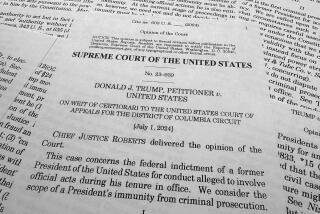Recent landmark U.S. Supreme Court rulings on 4th Amendment issues
- Share via
From Katz vs. United States to the present, landmark U.S. Supreme Court rulings on 4th Amendment issues
1967, – Katz vs. United States: The user of a public phone booth had an expectation of privacy; law enforcement needs a search warrant to electronically eavesdrop.
1968, Terry vs. Ohio: The Exclusionary Rule, barring use of illegally obtained evidence against a defendant, cannot be invoked to exclude the products of legitimate and restrained police investigative techniques such as “stop and frisk” searches of outerwear.
1973, Schneckloth vs. Bustamonte: The consent given police to search the car of a driver stopped for a traffic violation is valid even if the driver was unaware he had the right to refuse.
1976, United States vs. Janis: The Exclusionary Rule isn’t applicable in civil forfeiture proceedings.
1976, United States vs. Martinez-Fuertes: The 4th Amendment doesn’t categorically require “individualized suspicion” for police to stop a car near the Mexican border in which the occupants were later determined to be illegal aliens.
1978, Zurcher vs. Stanford Daily: Police had probable cause to search the campus newsroom for photographs that could identify assailants in a violent clash between police and protesters; the Constitution doesn’t prohibit search warrants where the press is involved.
1984, Leon vs. United States: A “good faith” exception is recognized in allowing evidence seized on the basis of a mistakenly issued search warrant to be introduced at trial. The exclusionary rule is not a right but a remedy to deter illegal police conduct.
1991, County of Riverside vs. McLaughlin: A probable cause hearing for an arrestee can be combined with arraignment if conducted within 48 hours.
2001, Kyllo vs. United States: Use of thermal imaging technology to detect excessive heat levels inside the home of a man suspected of growing marijuana under heat lamps constitutes a search that is presumptively unreasonable without a warrant.
2002, Board of Education vs. Earls: Tecumseh, Okla., school district authorities didn’t need probable cause to suspect drug use by students required to submit to drug testing to participate in extracurricular activities.
2007, Los Angeles County vs. Rettele: The 4th Amendment was not violated when deputies rousted a couple out of bed and forced them to stand unclothed while they searched their home with a warrant for possibly armed suspects of a different race.
2008, ACLU vs. NSA: Supreme Court denies review of a U.S. 6th Circuit Court of Appeals dismissal of the lawsuit challenging the National Security Agency’s secret access to citizens’ telecommunications records.
2009, Safford vs. Redding: While the strip-searching of a 13-year-old student by school authorities looking for drugs was a violation of her 4th Amendment rights, the officials who carried out the search were deemed immune from liability.
2010, Ontario vs. Quon: The search of a city police officer’s text messages by his government employer was reasonable because public employees don’t have an expectation of privacy in using employer-provided telecommunications.
Sources: Cornell University and University of Santa Clara law schools, Times reporting
More to Read
Sign up for Essential California
The most important California stories and recommendations in your inbox every morning.
You may occasionally receive promotional content from the Los Angeles Times.













